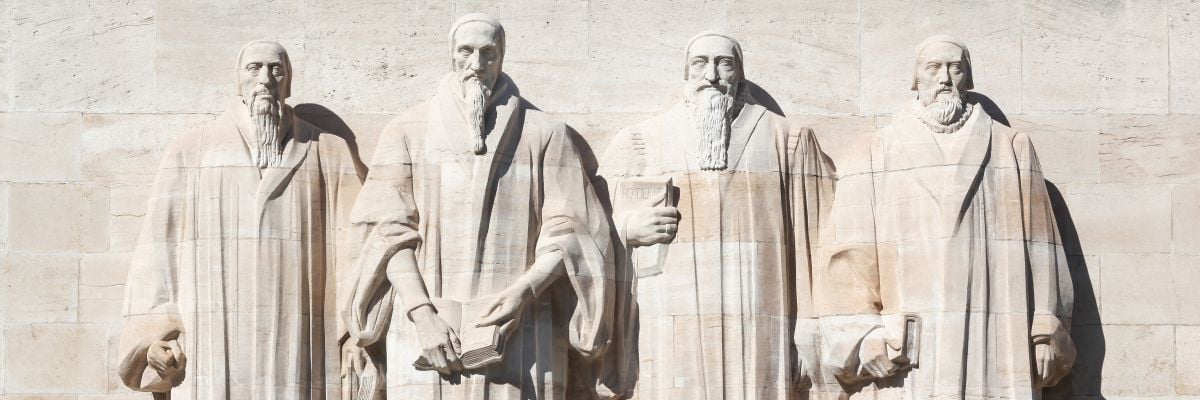
In my study of Calvinist authors, I’ve noticed an interesting line of argument they’ve used against non-Calvinist Protestants (usually called “Arminians”). Essentially, they argue that Calvinism represents the only consistent response to the claims of Catholicism. The eighteenth-century Calvinist preacher Augustus Toplady even preached a whole sermon called, “Arminianism: The Road to Rome.”
Why would they think this?
Calvinists often claim Jesus did not merely make salvation possible through his death on the cross, he made it definite by dying for only those people God chose to save (“the elect”). The Calvinist scholar A.W. Pink wrote of Jesus’ death on the cross, “Not one for whom he died can possibly miss heaven.” It follows from Pink’s reasoning that Jesus did not die on the cross for people who will “miss heaven” and be damned. This is called a “limited atonement,” though some Calvinists prefer calling it a “particular” or “definite atonement.”
While the idea that Jesus didn’t die for everyone strikes most Christians as bizarre, some Calvinists consider it a strong argument against not just Catholicism, but all non-Calvinist theologies. They say that if Jesus died for everyone, and if not everyone is going to heaven, it follows that the difference between the saved and the damned must be found in those people’s free choice to receive or reject the grace Christ merited for them on the cross. Once you have this mindset, they say, then identifying the reception of Christ’s grace with sacraments such as the Eucharist makes perfect sense.
Perhaps that’s why after my debate with him at the G3 conference in 2017, James White offered a session at the conference entitled, “The Atonement: The Strongest Refutation of Rome’s Eucharistic Errors.” And in a recent episode of the Dividing Line, he said, “Listening to a Roman Catholic saying what many non-Roman Catholics say, helps you to see where the inconsistent non-Roman Catholics miss the boat.”
But if the limited atonement is your strongest argument against the Mass, and that doctrine (which even some Calvinists reject) gets refuted, your fallback position can’t be found in inconsistent Arminian Protestantism. It must be found in Catholicism. So let me offer some reasons to believe that Jesus did atone for the sins of every human being.
To start, let’s turn to Paul’s first letter to Timothy where he urged that “supplications, prayers, intercessions, and thanksgivings be made for all men” (1 Tim. 2:1). Paul considered this good in his sight because God “desires all men to be saved and to come to the knowledge of the truth” (1 Tim. 2:4). If God wants all people to be saved, he must have provided some way for any person to be saved through the reception of the grace Christ merited for him on the cross.
This saving grace is available to all people, but it won’t have the same effect in every person. Those who accept God’s offer of salvation and remain in his friendship make God’s grace efficacious. That is why Paul said that God “is the Savior of all men, especially of those who believe” (1 Tim. 4:10). God makes salvation available to all, even if all do not choose to receive it.
Calvinists usually reply to this argument by saying that in 1 Timothy 2:1-4 Paul is talking about how God desires the salvation of all “kinds” of men, even if he doesn’t desire that every one of them go to heaven. For example, in verses one and two Paul says, “I urge that supplications, prayers, intercessions, and thanksgivings be made for all men, for kings and all who are in high positions, that we may lead a quiet and peaceable life, godly and respectful in every way.”
Calvinists again reply that Paul is talking about praying for all kinds of men, both rich and poor, rather than for every single human being. This is pleasing to God because God desires people from every social status to be saved, even if he does not desire that every person be saved. But desiring the salvation of all people and desiring the salvation of all kinds of people are not mutually exclusive.
We could imagine a crew member on the Titanic rebuking a fellow crew member who refused to help save poorer third-class passengers by saying, “Our job is to help all the passengers, including everyone in low positions, because we have to save all the passengers.” Just as the crew member will not let prejudice about social classes keep him from trying to save all the souls on board, God desires peace in human relationships so that all people can have the opportunity to hear the gospel and be saved.
Even if Paul were emphasizing that we should pray for people in all social classes rather than for all people in general, this doesn’t detract from Paul’s wish for all people to live in peace because this pleases a God who wants all people to be saved. The atheistic scholar Richard Carrier, who has no vested interest in either side of this theological debate, says that Paul “is telling people to pray for peace, on behalf of everyone alive, but in [verse four] he is describing what God wants . . . there is simply no other way to interpret what Paul is saying except that what God actually wants is all people, not some of all kinds of people, to be saved and to come to a knowledge of the truth.”
And because God wants all people to be saved, he has made the salvation of anyone a real possibility. This means that Christ indeed offered his life as a sacrifice for every human being. St. John affirmed that Christ “is the expiation for our sins, and not for ours only but also for the sins of the whole world” (1 John 2:2).
Christ made salvation possible for all people, but that salvation only becomes actual for those who choose to receive it through baptism (1 Pet. 3:21, John 3:5) and through persevering in faith (Matt. 10:22). Calvinists usually reply that 1 John 2:2 is talking about how Christ died not just for the saved in his local community of Christians but for all saved people throughout the entire world. However, this interpretation is less than obvious: when John talks about the “world” he clearly means the entire world, including unbelievers.
For example, 1 John 5:19 says, “We know that we are of God, and the whole world [ho kosmos holos] is in the power of the evil one.” This verse does not mean that only believers are under the power of the devil but that all people throughout the entire world suffer from the devil’s temptations. Yet these same words are found in 1 John 2:2, which says Christ atones not just for our sins “but also for the sins of the whole world [ho kosmos holos].” Southern Baptist David Nelson states:
In John 1 and 2 kosmos is used in the sense of both the earth and all the inhabitants of the earth, indicating that in the incarnation Jesus came to earth for the sake of saving all who would believe in him . . . to say that world refers to ‘all the elect’ or ‘all without distinction’ (i.e. all kinds, classes, or ethnicities) strains the plain meaning of the text.
White has written before that “the Reformed understanding of the atonement is the only view that can properly address the Roman Catholic concept of the Mass as a propitiatory sacrifice.” However, since a limited atonement is unbiblical, it follows that Calvinists who share White’s view have no reason to reject the Catholic Church’s teaching that God has given us his grace through the sacraments of his Church.



